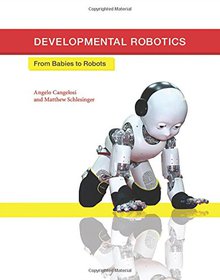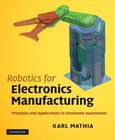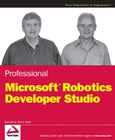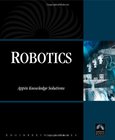Developmental Robotics
From Babies to Robots

Book Details:
| Publisher: | MIT Press |
| Series: | MIT Press |
| Author: | Angelo Cangelosi |
| Edition: | 1 |
| ISBN-10: | 0262028018 |
| ISBN-13: | 9780262028011 |
| Pages: | 408 |
| Published: | Feb 06 2015 |
| Posted: | Jul 21 2016 |
| Language: | English |
| Book format: | |
| Book size: | 8.02 MB |
Book Description:
Developmental robotics is a collaborative and interdisciplinary approach to robotics that is directly inspired by the developmental principles and mechanisms observed in children's cognitive development. It builds on the idea that the robot, using a set of intrinsic developmental principles regulating the real-time interaction of its body, brain, and environment, can autonomously acquire an increasingly complex set of sensorimotor and mental capabilities. This volume, drawing on insights from psychology, computer science, linguistics, neuroscience, and robotics, offers the first comprehensive overview of a rapidly growing field. After providing some essential background information on robotics and developmental psychology, the book looks in detail at how developmental robotics models and experiments have attempted to realize a range of behavioral and cognitive capabilities. The examples in these chapters were chosen because of their direct correspondence with specific issues in child psychology research; each chapter begins with a concise and accessible overview of relevant empirical and theoretical findings in developmental psychology. The chapters cover intrinsic motivation and curiosity; motor development, examining both manipulation and locomotion; perceptual development, including face recognition and perception of space; social learning, emphasizing such phenomena as joint attention and cooperation; language, from phonetic babbling to syntactic processing; and abstract knowledge, including models of number learning and reasoning strategies. Boxed text offers technical and methodological details for both psychology and robotics experiments.
Download Link:
Related Books:
Robotics for Electronics Manufacturing
Principles and Applications in Cleanroom Automation
Understand the design, testing, and application of cleanroom robotics and automation with this practical guide. From the history and evolution of cleanroom automation to the latest applications and industry standards, this book provides the only complete overview of the topic available. With over 20 years' industry experience in robotics design, Karl Mathia provides numerous real-world examples to enable you to learn from professional experience, maximize the design quality and avoid expensive design pitfalls. You'll also get design guidelines and hands-on tips for reducing design time and cost. Compliance with industry and de-facto standards for design, assembly, and handling is stressed throughout, and detailed discussions of recommended materials ...
Professional Microsoft Robotics Developer Studio
Microsoft Robotics Developer Studio (MRDS) offers an exciting new wayto program robots in the Windows environment. With key portions of the MRDS code available in source form, it is readily extensible and offers numerous opportunities for programmers and hobbyists. This comprehensive book illustrates creative ways to use the tools and libraries in MRDS so you can start building innovative new robotics applications.The book begins with a brief overview of MRDS and then launches into MRDS concepts and takes a look at fundamental code patterns that can be used in MRDS programming. You'll work through examplesall in C#of common tasks, including an examination of the physics features of the MRDS simulator. As the chapters progress, so does the level of di...
Robotics
This up-to-date text and reference is designed to present the fundamental principles of robotics with a strong emphasis on engineering applications and industrial solutions based on robotic technology. It can be used by practicing engineers and scientists -- or as a text in standard university courses in robotics. The book has extensive coverage of the major robotic classifications, including Wheeled Mobile Robots, Legged Robots, and the Robotic Manipulator. A central theme is the importance of kinematics to robotic principles. The book is accompanied by a CD-ROM with MATLAB simulations....
2007 - 2021 © eBooks-IT.org



